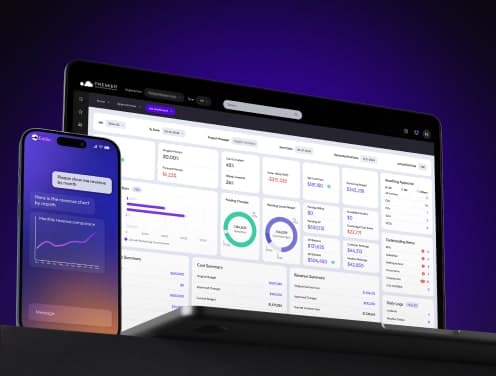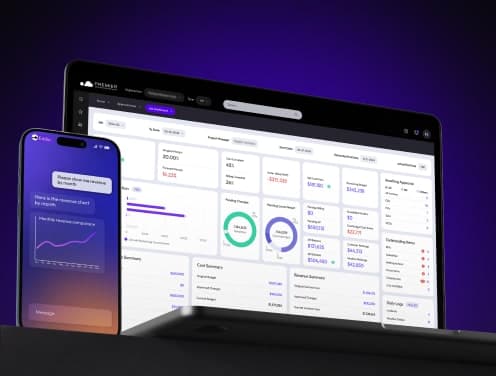
Calculating ROI - The Real Benefits of Investing in a Construction ERP System
In the fast-paced construction industry, every dollar counts, making return on investment (ROI) a pivotal metric for success. With rising costs and fluctuating project timelines, understanding how investments impact financial performance is crucial for construction companies striving to maintain profitability.
Enterprise Resource Planning (ERP) systems have emerged as powerful tools in this sector, revolutionizing operations and streamlining processes. By integrating various business functions, construction ERP systems aim to tackle common challenges like cost overruns, inefficient communication, and delays that often plague projects.
In this article, we will explore the significance of calculating ROI when investing in a construction ERP system, delve into the key features and benefits it offers, and outline best practices for successful implementation to ensure that your investment yields measurable financial returns.
The Importance of ROI in Construction ERP Investments
Investing in a Construction ERP system is crucial for construction companies aiming to optimize ROI beyond traditional financial metrics. By improving operational efficiency, these systems significantly reduce project downtime and enable project managers to make better-informed decisions throughout the project lifecycle. The automation of business processes minimizes manual tasks, elevating productivity and boosting the potential for ROI.
Construction ERP systems offer accurate, real-time financial data that helps manage budgets effectively, preventing cost overruns and ultimately enhancing profitability. Additionally, by streamlining procurement and project management, these systems allow construction firms to secure better deals on raw materials and ensure timely delivery, further increasing ROI.
To maximize these benefits, construction businesses should focus on the comprehensive evaluation of ERP systems. This includes assessing how the system enhances operational efficiency, supports data-driven decisions, and contributes to cost savings. Implementing a well-chosen ERP system can profoundly impact project success and long-term company growth.
Key Challenges in Construction Management
The construction industry faces several challenges that necessitate robust management strategies. Construction companies must navigate risk, compliance, quality control, and regulatory requirements while adhering to tight deadlines and strict budget constraints. Small construction firms often rely on manual processes, which are prone to errors and not scalable, making it difficult to efficiently address these challenges. The growing complexity and competitiveness of the industry emphasize the essential need for effective resource management and the adoption of integrated solutions to enhance project efficiency and profitability.
Cost overruns
Cost overruns are a prevalent issue, with studies indicating that 98% of major projects exceed budgets by over 30%. Implementing a construction ERP system allows project managers to closely monitor expenses against the budget at every phase, ensuring better financial control. Real-time integration of financial data within ERP systems aids in more accurate forecasting and reduces the likelihood of costly overruns. Addressing delays in material orders and resource scheduling through effective ERP solutions helps maintain project costs within budget limits.
Inefficient communication
Inefficient communication leads to as much as 48% of costly rework in construction projects. ERP systems provide a centralized platform that enhances communication, reducing poor coordination and minimizing project rework. By offering real-time updates and centralized communication channels, ERP solutions ensure all team members are informed and can effectively collaborate. This integrated approach significantly reduces the chances of missed deadlines and project failures due to internal miscommunication.
Project delays
Improper planning is a major cause of project delays, resulting in financial losses and damage to a construction company's reputation. Effective scheduling and management of raw materials and resources are critical in avoiding extended project cycles. Construction ERP systems mitigate delays by enabling precise tracking and analysis of procurement, labor, and equipment data. By consolidating operational data and fostering stakeholder collaboration, ERP solutions minimize the risk of miscommunication and facilitate timely project execution.
Understanding ERP Systems
Enterprise Resource Planning (ERP) systems act as a centralized platform for construction companies, fostering strong communication across teams and addressing industry-specific challenges like project management and resource optimization. By integrating data from various departments, ERP systems enhance visibility and promote collaboration, ensuring all stakeholders are aligned and projects are executed seamlessly. Advanced features like predictive analytics allow teams to anticipate potential issues, reducing risks and improving project outcomes.
Definition and purpose of ERP
An ERP system for the construction industry is designed to manage business operations from pre-construction to post-completion, tackling the complexities inherent in the construction process. These solutions provide a centralized database that efficiently handles finance, human resources, warehouse management, and planning activities. By integrating data from various departments, ERP systems ensure that construction projects are seamlessly executed, supporting both strategic decision-making and operational efficiency.
How ERP integrates business processes
ERP systems in the construction industry integrate business processes such as inventory management, procurement, finance, and human resources into a single coherent system, streamlining operations. This integration enhances project scheduling and resource planning, aligning project timelines with material availability and manpower. By automating repetitive business functions like payroll and customer service, ERP systems diminish manual data input, allowing project managers to focus on high-value activities. Their modular nature lets construction firms implement specific features tailored to their unique needs, facilitating effective management of core business processes.
Essential Features of Construction ERP
Real-time data access
A construction ERP system provides project managers with real-time data access, allowing them to monitor project activities and progress at various locations effectively. This enables more accurate billing for clients by tracking staff time on each task. The centralized data system reduces fragmentation, fostering better communication among teams and informed decisions, thereby enhancing overall project efficiency.
Automation tools
Automation tools within a construction ERP system streamline procurement and supply chain management, reducing manual errors and increasing efficiency. By automating repetitive tasks, these systems allow construction employees to focus on more critical strategic work. Additionally, ERP solutions simplify compliance through customizable reporting tools, making audits less labor-intensive and ensuring seamless monitoring of project status.
Financial management capabilities
Construction ERP systems offer robust financial management capabilities with integrated accounting modules for tracking project costs and managing budgets. This results in enhanced financial visibility and improved decision-making, preventing cost overruns. Real-time financial data empowers construction firms to manage budgets effectively, supporting better forecasting and control over project expenses to ensure projects stay within financial constraints.
Real-time data access
Real-time data access through a construction ERP system is a game-changer for construction companies. It allows project managers to effectively monitor various activities and track project progress across multiple locations. This real-time visibility enables accurate tracking of staff time on each task, leading to precise client billing.
By housing all project information in one integrated system, real-time data minimizes fragmentation and promotes seamless communication among teams. With immediate insight into project costs and inventory levels, construction businesses can enhance their operational decision-making and boost financial performance. These data-driven decisions are vital for avoiding cost overruns and improving cash flow management.
Moreover, real-time data empowers construction managers to make informed choices swiftly, significantly enhancing overall project efficiency. This centralization ensures that all stakeholders, including contractors, have the information they need to plan effectively, manage raw materials, and achieve significant cost savings in their business operations.
Evaluating the Financial Benefits of ERP
Implementing a Construction ERP system provides construction businesses with numerous financial advantages. It enhances operational efficiency, leading to significant cost savings and improved project management. By offering real-time access to financial data, ERP systems help mitigate budget overruns—a common hurdle in the construction industry—facilitating better budget management. Moreover, the accurate budgeting, cost control, and financial reporting capabilities of ERP systems enable informed decision-making, driving profitability and healthier financial performance for construction companies.
Cost savings through efficiency
Construction ERP systems streamline and automate business processes, reducing human error and boosting efficiency in expense management. They offer real-time data analysis, which aids in accurate cost tracking and budget management, enhancing financial oversight. By integrating financial, procurement, and operational data, ERP systems provide valuable insights that improve cost control. Effective procurement processes within ERP systems directly contribute to profitability, allowing construction companies to master cost control and improve operational efficiency.
Improved project forecasting
Access to accurate, real-time data on construction projects enhances project forecasting efforts. ERP tools offer clarity on current expenditures and resource allocation. They can analyze historical project data, helping construction firms identify trends and improve future cost estimates. With effective budgeting and forecasting tools, companies can reliably plan future projects based on historical performance. Enhanced financial reporting through ERP systems aids in making informed decisions that impact future project planning and budgeting.
Enhanced cash flow management
Effective cash flow management is crucial in construction to prevent project delays and financial setbacks. Cloud-based ERP software allows construction businesses to consolidate bank balances, billing information, and invoices, providing a clear overview of cash flow. Real-time access to cash position details enables companies to efficiently manage contractual obligations and payroll in a dynamic environment. ERP systems monitor every project facet, including ongoing tasks and employee time logs, ensuring firms can promptly respond to changing conditions and keep projects on track.
Measuring ROI in Construction ERP
Implementing a construction ERP system offers significant ROI by streamlining core business processes and enhancing operational efficiency. By accurately estimating materials, labor, and timelines, these systems allow construction companies to better manage costs and reduce project overruns. This centralized approach reduces redundant data and licensing costs, leading to improved profit margins and higher overall return on investment.
Enhanced workflows and integrated systems ensure better customer loyalty and satisfaction, further boosting profitability. The ability to optimize multiple projects in real-time prevents cost overruns, directly enhancing ROI. Furthermore, construction ERP systems aid in precise forecasting, which is crucial for maintaining financial health and supporting future projects.
Key performance indicators (KPIs)
Construction ERP systems provide real-time analytics that enable construction firms to monitor KPIs and keep projects on schedule. Access to historical data on costs and resources helps identify inefficiencies, leading to streamlined workflows and reduced waste. The cloud-based visibility allows project managers to track performance from anywhere, ensuring timely adjustments for better outcomes.
Data-driven insights derived from ERP systems empower construction companies to optimize processes and minimize costs. This not only results in faster project delivery but also strengthens industry competitiveness. By fostering transparency and collaboration, ERP integration positively impacts client relationships, making project management more effective and communication seamless.
Calculating the return on investment
Calculating ROI in the construction industry extends beyond monetary gains, focusing also on the improved efficiency from ERP implementation. ERP software automates manual processes, freeing contractors from tedious tasks and leading to increased ROI. Additionally, the system’s ability to accurately evaluate project costs aids in securing investments and validating initial business decisions.
Real-time data access provided by ERP systems empowers contractors to make informed decisions, enhancing both operational efficiency and budget management. This proactive approach to financial planning and resource allocation directly contributes to higher ROI, proving the value of investing in a robust construction ERP system.
Best Practices for ERP Implementation
Implementing an Enterprise Resource Planning (ERP) system in the construction industry can transform business operations. To ensure success, it’s essential to follow best practices in stakeholder engagement, change management strategies, and alignment with business goals.
Stakeholder Engagement
Engaging stakeholders early in the ERP implementation process is vital for smooth adoption. Involving project managers, field workers, and other key players can uncover critical areas needing improvement. Effective communication facilitated by ERP systems, which provide real-time updates and centralized channels, ensures everyone is informed and aligned. By involving stakeholders from different departments, construction companies can better address issues like delays and cost overruns.
Change Management Strategies
Implementing change management strategies from the start of an ERP project is critical to overcoming resistance to new software. Clear communication of ERP advantages helps employees understand its goals, fostering acceptance. Comprehensive training programs enhance employee proficiency, ensuring a seamless transition. A successful change management strategy reduces barriers and promotes engagement, improving project outcomes.
Alignment with Business Goals
Aligning ERP systems with business goals starts with assessing business requirements and current processes. This assessment ensures the ERP solution supports both immediate needs and future growth. Leveraging expert guidance facilitates alignment between system capabilities and strategic objectives. Real-time data availability from ERP systems aids informed decision-making, crucial for aligning daily operations with overarching business goals.
Each of these practices ensures that ERP implementation not only enhances operational efficiency but also supports the strategic objectives of construction businesses.
Conclusion
In conclusion, implementing a Construction ERP system is a game-changer for construction businesses seeking to enhance operational efficiency and competitiveness. By integrating various business processes, these systems streamline workflows and improve communication across departments, which is crucial for project success. Real-time access to financial data allows construction companies to better manage project costs and forecasts, significantly reducing the risk of budget overruns.
Moreover, ERP systems provide a unified platform for project data, minimizing fragmentation and enabling collaborative problem-solving. This facilitates informed and data-driven decisions, expediting project planning and execution. With superior construction management software, project managers can allocate resources effectively, addressing potential issues proactively to boost profitability.
The construction industry’s growing adoption of ERP software signals a strategic move towards embracing digital transformation. This step ensures construction firms are well-equipped to handle complexities and prepare for future project challenges, resulting in cost savings and seamless communication. In essence, a Construction ERP system offers valuable insights and tools necessary for modern construction businesses to thrive.





















